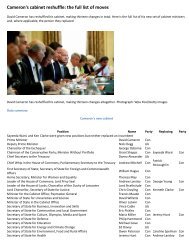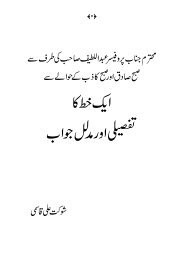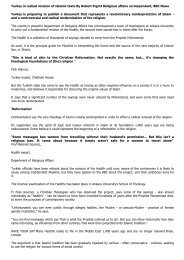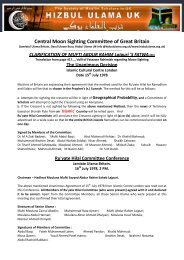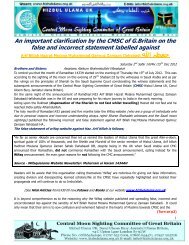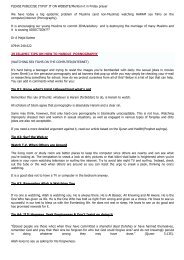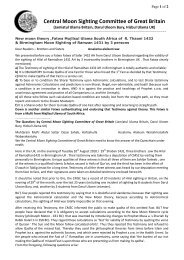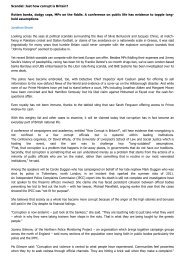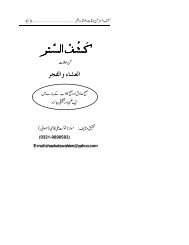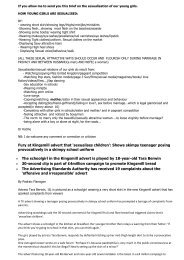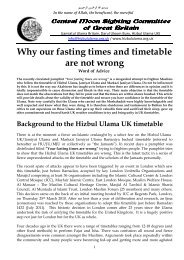ISLAMIC MANNERS-24 Using Mobile Phones - Hizbul Ulama UK
ISLAMIC MANNERS-24 Using Mobile Phones - Hizbul Ulama UK
ISLAMIC MANNERS-24 Using Mobile Phones - Hizbul Ulama UK
Create successful ePaper yourself
Turn your PDF publications into a flip-book with our unique Google optimized e-Paper software.
<strong>ISLAMIC</strong> <strong>MANNERS</strong>-<strong>24</strong><br />
<strong>Using</strong> <strong>Mobile</strong> <strong>Phones</strong><br />
Etiquettes of the <strong>Mobile</strong> Phone<br />
Islam has never been opposed to advancement. However, certain advancements are such that together with their<br />
benefits come much harm. Whilst mobile technology and the mobile phone in particular has revolutionised the way we<br />
live, it is important that we utilise such technology appropriately.<br />
Crude Manners<br />
It is important to realise that there are certain etiquettes of speaking on the phone. For example when calling someone,<br />
many people do not first ask the person they are calling whether it is convenient for them to speak at that very moment.<br />
They simply begin a long conversation without any regard for the inconvenience they cause the person they have called.<br />
There are yet others who, whilst in the company of others, answer phone calls and begin to casually converse with<br />
whoever has called them. Doing this is akin to turning your face away from those in your company whilst in the middle<br />
of a conversation and engaging in conversation with someone else without any explanation or apology to the first. Such<br />
behaviour is indeed inappropriate and a reflection of crude manners.<br />
Robber of Time<br />
The mobile phone, whilst being a very useful item, can prove to be a robber of time too. People feel obliged to utilise the<br />
free minutes and texts they have within their contract. If one has an allowance of 500 minutes or 500 texts within his<br />
talk plan, it is not necessary to utilise all these minutes or texts. By calling people or texting them only to use up the<br />
allowance, we are wasting valuable time which could have been utilised in productive activities.<br />
Text Messages<br />
Nowadays, many people send 'Jumu'ah Mubarak' text every week to friends and associates. The contents of many of<br />
these texts are not authentic and sometimes not in line with Islamic teachings. One needs to be cautious before<br />
forwarding any message of this nature. Many people forward these messages just because they apparently sound good<br />
irrespective of the message being incorrect. Do not forward any message until you are sure of its authenticity.<br />
If you are keen to propagate the beautiful teachings of Islam by using the text facility then make sure it is something<br />
beneficial, correct and authentic. Moreover, the day of Jumu'ah should not be fixed for this; any day and every day<br />
should be made mubarak by conveying a piece from the teachings of our beautiful dīn.<br />
Name at the End of Text<br />
Whenever you send a text message, it is important to write your name at the end of the text, because it is possible that<br />
the person you are texting has not saved your number on his mobile. As a result, he will be confused and<br />
inconvenienced when he receives the text due to not knowing who the sender is.<br />
In The Masjid<br />
When attending the masjid one should switch off his mobile. Failure to do so will result in one being disrespectful to the<br />
house of Allāh as well as being a means of disturbance to others if the phone were to ring. It is prudent not to even<br />
leave the phone in vibration mode. In this situation if the phone were to receive a call during salāh, not only will it divert<br />
the phone owner's attention it will also disturb the person next to him. Many people immediately after the completion of<br />
salāh check their phones for possible missed calls or messages. This shows that although one was physically standing in<br />
the court of Allāh, mentally he was elsewhere. Thus we should switch our phones off before entering the masjid and not<br />
pay attention towards them until we leave.<br />
Haram Sharīf<br />
Many people would not even dream of answering a phone call whilst in the masjid when they are in their localities.<br />
However we observe the very same people freely using the mobile phone in the Haram Sharīf in Makkah and Madīnah.<br />
One should make a firm resolution and refrain from this for this leads to neglect and many other wrongs whilst in<br />
blessed places.<br />
Musical Ring Tones<br />
We should make sure that we have an appropriate simple ring tone on our mobile phone. To keep a musical ring tone is<br />
harām as the playing of music, or being a means of it being played is a sin. It is quite unfortunate that even when in<br />
Haramayn Sharīfayn whilst performing tawāf or presenting salām to the Prophet sallallāhu 'alayhi wasallam, the musical<br />
tones of mobile phones are heard.<br />
This is harām and a major sin. Safeguard yourself from such things that distance you from the Creator.
'Islamic' Ring Tones<br />
The adhān, salām, tilāwah of the Glorious Qur'ān, nāt and nashīd are used as ring tones by many on mobile phones. The<br />
adhān has a set time and a purpose and should only be announced at the time for the stipulated purpose. Salām also<br />
has a specific purpose which is to greet one another. The Glorious Qur' ān is the word of Allāh and has been sent for<br />
guidance of mankind. The Shari'ah has stipulated many rulings in regard to this great book. Nāt and nashīd are recited<br />
to inculcate and increase the love for our beloved Prophet sallallāhu 'alayhi wasallam in our hearts. None of these should<br />
be used to inform us that someone is calling us. This is disrespectful. One should merely keep a simple ring tone for this<br />
purpose.<br />
How Many Rings?<br />
If when ringing someone one finds that the phone cuts off after a few rings or diverts to an answering machine, then<br />
the caller may try again. One should retry a maximum of three times for it may be that the person was busy and as he<br />
approached the phone it stopped ringing and thus he was unable to answer. However, there are some phones that do<br />
not divert or cut-off and keep ringing. In such cases the caller should let it continue ringing for that duration which<br />
would be considered normal, approximately ten rings. If the call is not answered then put the phone down because not<br />
answering indicates that the person is either occupied or does not wish to speak. Do not cause inconvenience by<br />
compelling.<br />
<strong>Mobile</strong> and Teachers<br />
It is not permissible for teachers at madrasah or school to use the mobile during their working hours for the madrasah<br />
and the school has purchased that time from them. This time does not belong to them; it has become the property of<br />
the employing establishment.<br />
Source: At-Tazkiyah - wisdom of Shaykh Muhammad Saleem Dhorat



